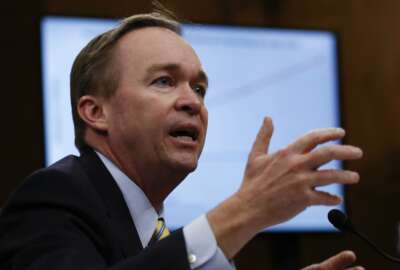President Donald Trump’s long-promised hiring freeze on the entire federal civilian workforce will wind up hurting veterans hiring and the IRS’ ability to go after tax cheats, according to the senator who ran against him in the election.
Sen. Tim Kaine (D-Va.) told WTOP morning anchors Mike Moss and Joan Jones on Tuesday that across-the-board hiring freezes under Democratic and Republican presidents have been found to cost the government more in the long-run, while also making government run less effectively.
“They hurt the operations of government, they hurt citizens, and they don’t save money. For example, there’s a backlog right now in processing claims for veterans benefits and Social Security disability claims. If you freeze hiring, and as people retire, you don’t fill in the positions of people working on those claims. We’re going to make it harder for veterans to get their benefits, and harder for seniors and [the] disabled to get [Social Security Disability Insurance] benefits,” Kaine said.
Presidents Jimmy Carter and Ronald Reagan both implemented governmentwide federal civilian hiring freezes, but the Government Accountability Office in 1982 reported that across-the-board freezes did little to reduce the size of the federal workforce and did little to cut costs.
“Because they ignored individual agencies’ missions, workload, and staffing requirement, these freezes disrupted agency operations and, in some cases, increased costs to the government,” the GAO report said.
Kaine, a former Virginia governor and the vice presidential candidate for Hillary Clinton’s 2016 presidential campaign, said a targeted, agency-by-agency hiring freeze would be more effective if the Trump administration deemed the federal workforce to be too big.
However, the federal workforce, as a percentage of the total U.S. workforce, is the smallest now than it has been in the past 70 years, according to the Washington Post. As of December 2016, it accounted for only 1.93 percent of the national workforce.
Trump first proposed the hiring freeze in October 2016 as one of six measures that he said would “clean up the corruption and special interest collusion in Washington.”
While the Trump administration’s hiring freeze exempts the military, Kaine said veterans, who get preferential consideration for civilian federal jobs, would be negatively affected by the freeze.
“Our federal workforce has great workers. It’s a highly veteran workforce, because of veteran’s hiring preferences. And pitching the notion that the federal workforce is corrupt or colluding with special interests is frankly offensive to hard-working and patriotic people,” Kaine said.
Trump’s Treasury Secretary nominee Steve Mnuchin told the Senate Finance Committee on Jan. 19 that the IRS did not have enough employees to go after tax cheats.
“When you don’t hire people in who are going after tax cheats and tax frauds and collecting revenue from them, you cost the government money,” Kaine said.
Copyright
© 2024 Federal News Network. All rights reserved. This website is not intended for users located within the European Economic Area.
